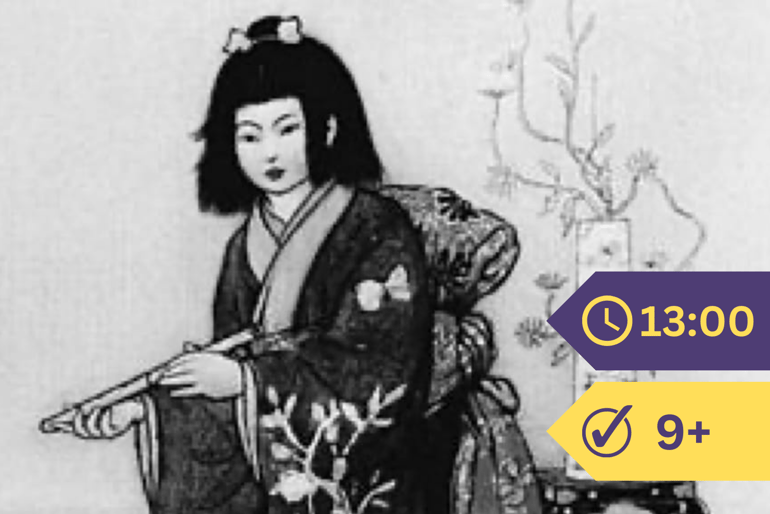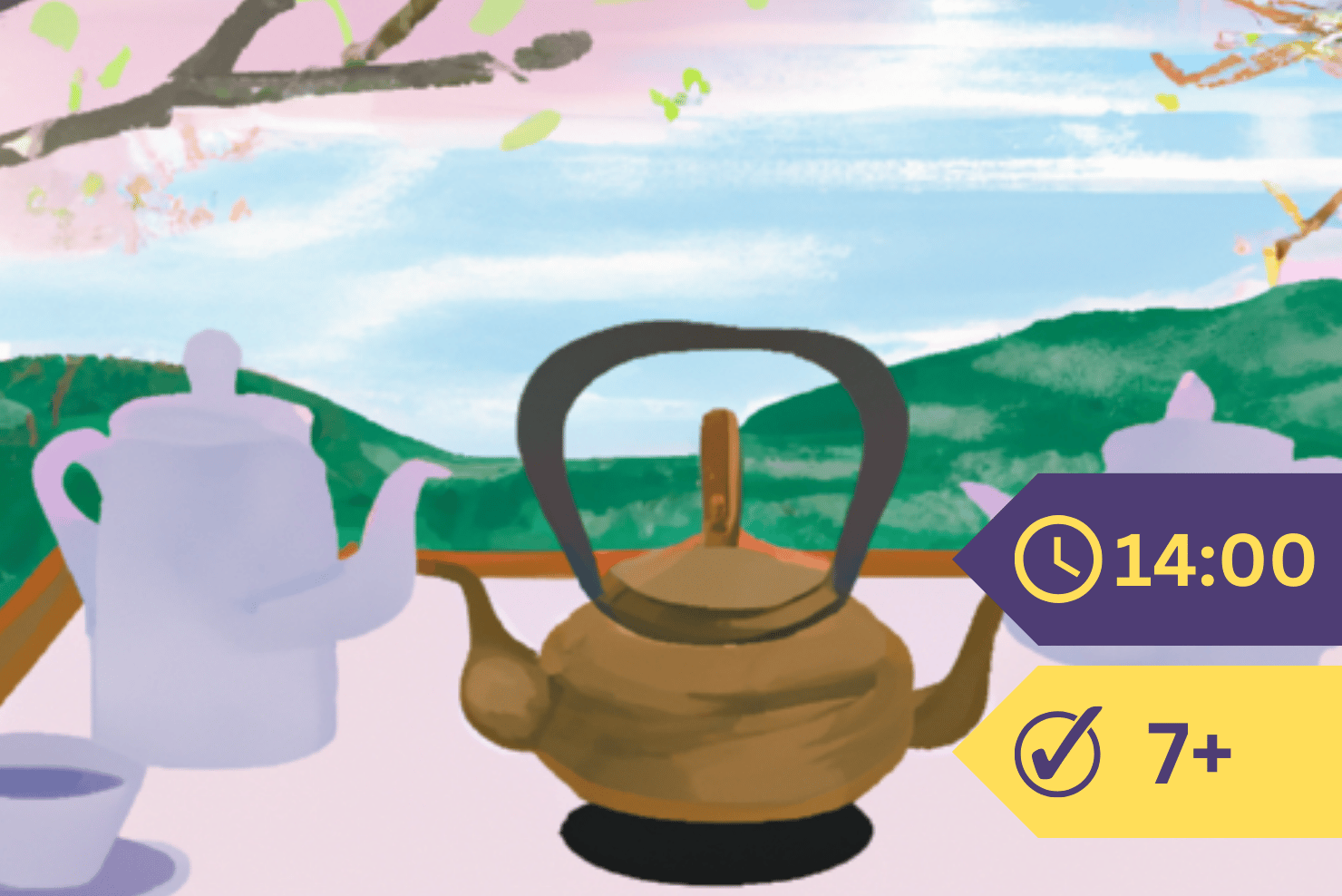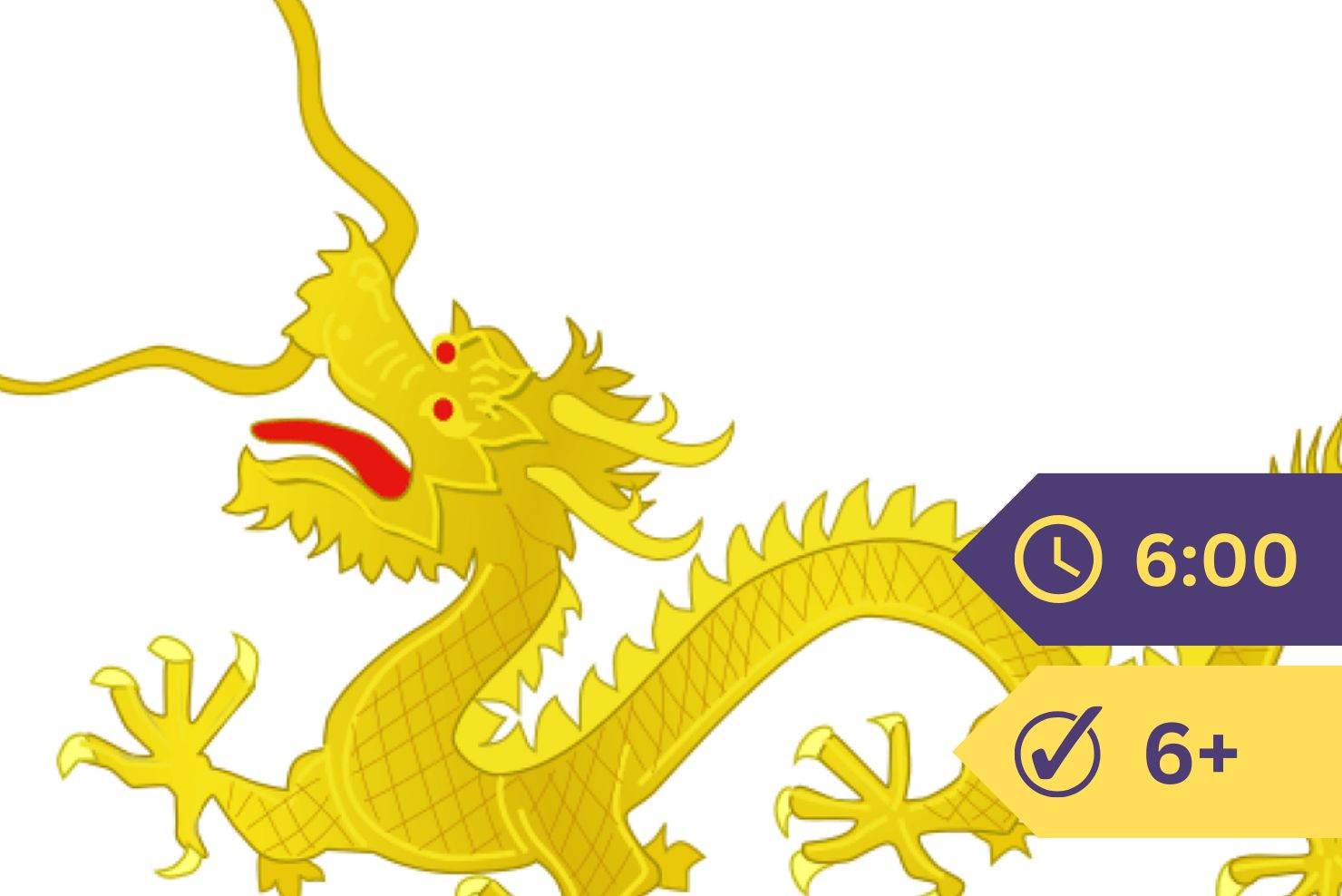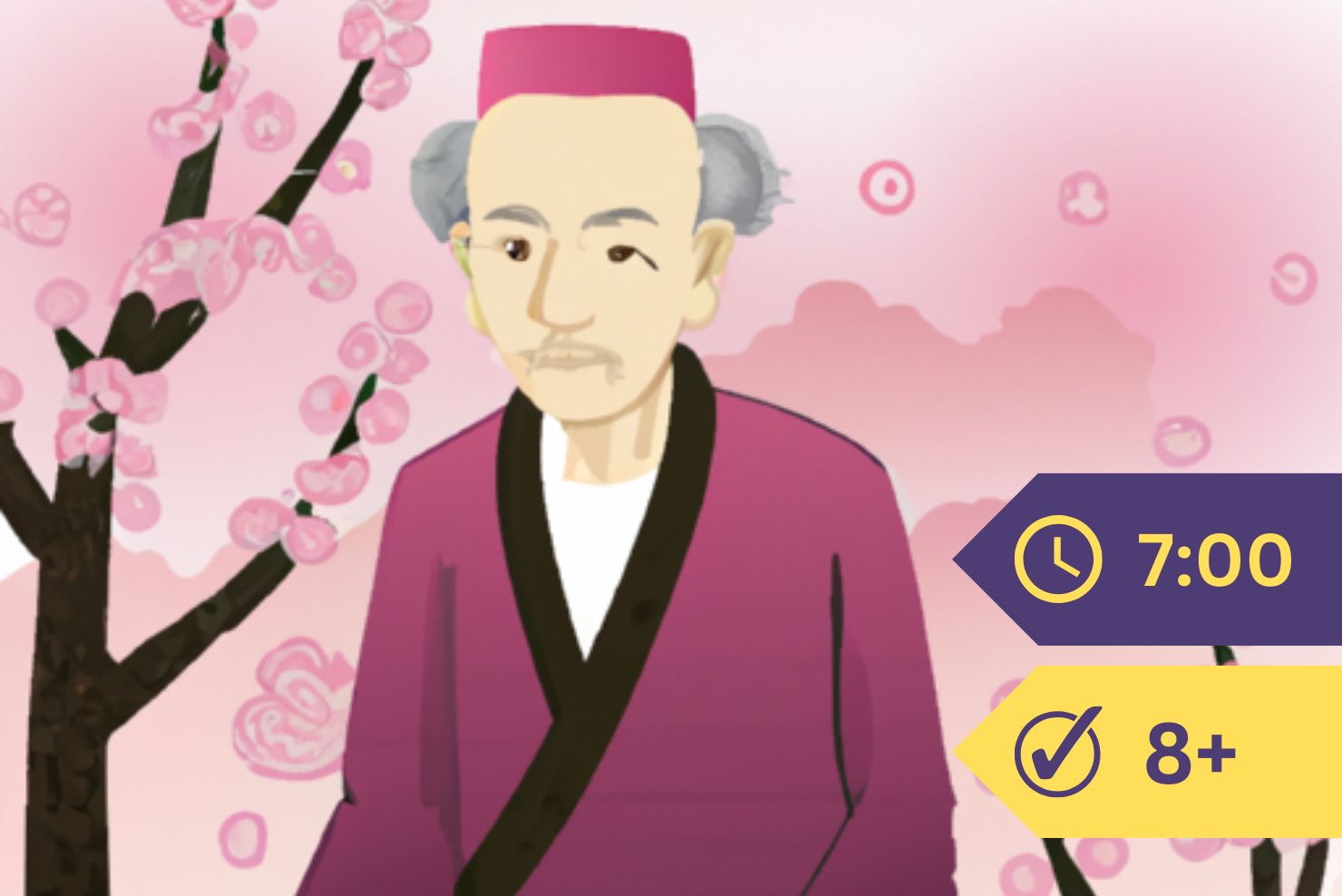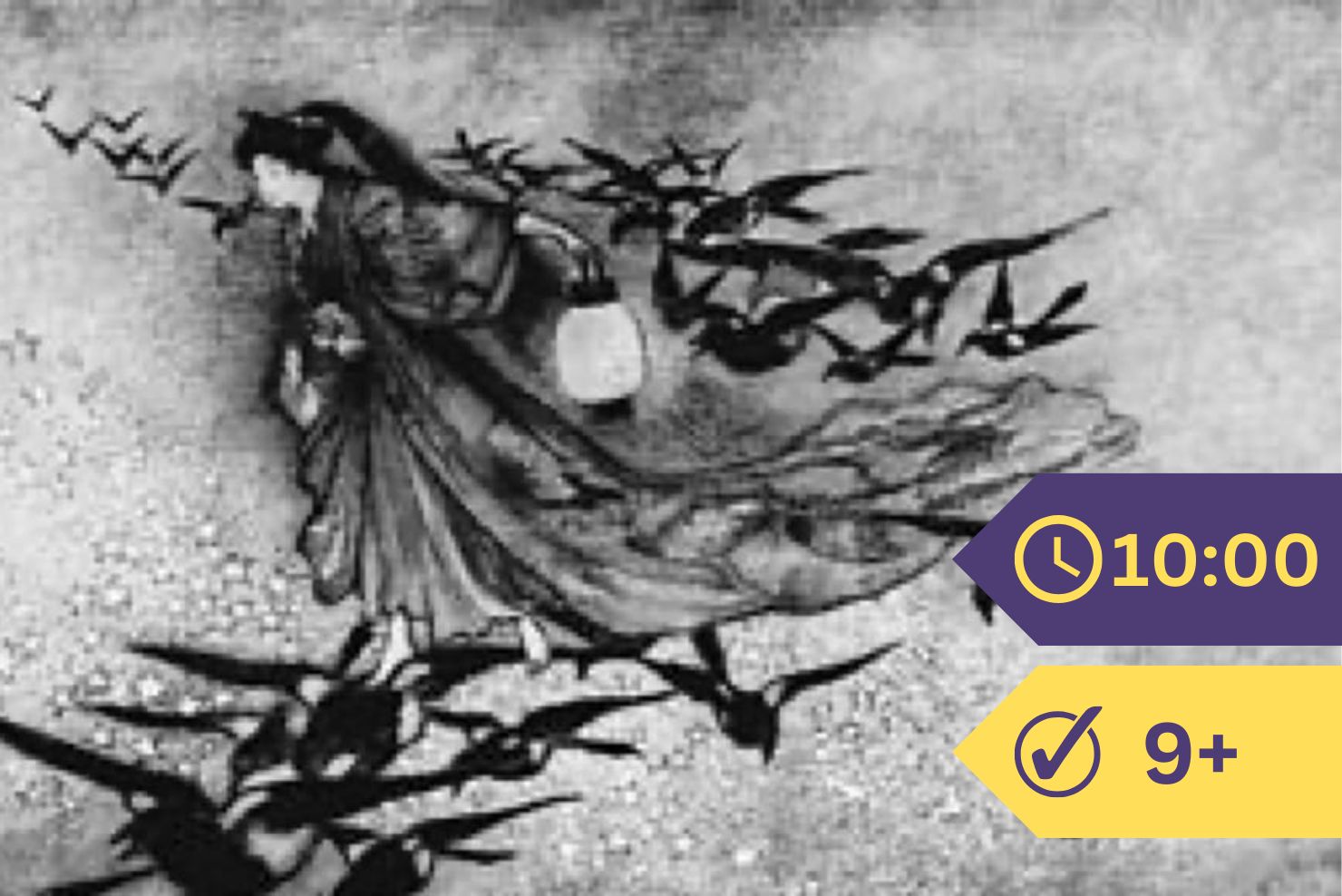Long ago, in Yedo, there lived a man of good lineage who was always honest and true to his word. His wife was a gentle and loving woman. He loved her very much, but secretly grieved that she did not bear him sons. She did give him a daughter, whom they named “O’Yoné”, which means “rice in the ear.” They cherished the child and guarded their precious one with their lives. The child grew up with white skin and rosy cheeks. She had beautiful, elongated eyes and was as slender and straight as bamboo.
In the autumn when O’Yoné was twelve years old, her mother fell ill. She was nauseous and tormented by pains. Before the red of the maple leaf had faded, she died and returned to the earth. Her husband was desperate and wild with grief. He cried loudly and beat his chest. He lay on the ground and refused any form of comfort. He spent days without eating or sleeping. The child was very quiet.
Time passed. The man tended to his business. Winter snow covered his wife’s grave. The path from his house to the abode of the dead was also snow-covered. Only the faint footprints of the child’s sandals were visible. In spring, he tied the sash of his robe and went out to see the cherry blossoms. He was even cheerful enough to write a poem on gilded paper. He hung the poem on a cherry tree so that it could flutter in the wind. The poem honored spring and rice wine. Later, he also planted the Lily of Forgetfulness and no longer thought of his wife. But the child remembered her mother.
Before the year was out, he brought a new bride home. She had a beautiful face but a black heart. The man, the poor fool, was pleased. He praised the woman to his child and believed that now everything was good. But the stepmother hated the child with jealous and deadly hatred. She was very envious that the man loved his daughter O’Yoné so much. Every day, she wanted revenge. The gentle ways and patience of the child only made it worse. But in the presence of the father, the stepmother dared not harm O’Yoné. So she waited for her time. The poor child spent her days and nights in torment and terrible fear. But she said nothing about these things to her father. That’s the way of children.
After some time, the man was called away to a distant city by his business. The name of the city was Kyoto. It took many days to travel from Yedo to Kyoto on foot or horseback. They needed him there, so he had to go. He would be gone for three moons or more. Therefore, he prepared himself. He rested beforehand with his servants who would go with him. When all necessary things were arranged, the last night before departure arrived. He would leave at dawn the next morning.
He called O’Yoné to him and said, “Come here, my dear little daughter.” So O’Yoné knelt before him. “What gift shall I bring you from Kyoto?” he asked. But the girl hung her head and did not answer. “Answer and don’t be so rude, little daughter,” he ordered her. “Will it be a golden fan, a roll of silk, or a new red brocade sash? Or do you prefer a large playfield with images and lights on it?”
She burst into bitter crying and he took her on his lap to calm her. But she hid her face with her sleeves and cried as if her heart would break. The only thing she said was, “Oh Father, Father, Father, don’t go away, don’t go away.”
“But darling, I must go,” he replied. “I will be back soon. So soon that it will hardly seem like I am gone. Before you know it, I will be here for you with beautiful gifts in my hand.”
“Father, take me with you,” she said.
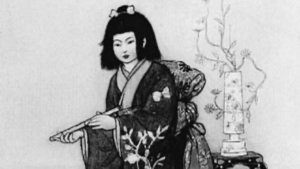
“Unfortunately, that is not a wise idea. It’s really not a good idea to take a little girl with you. Do you want to walk the whole way on your feet, my little pilgrim? Or do you want to ride a pack horse? And how would you fare in the inns of Kyoto? No, my darling, you stay here. I am only gone for a short time. Your kind mother will be with you.” She shuddered in his arms. “Father, if you go, you will never see me again,” she said.
Then the father suddenly felt an icy shiver go through his heart, so much so that it stopped him. But he didn’t want to pay attention to it. What now? Should he, as an adult strong man, be carried away by a child’s fantasies? He pushed O’Yoné away from him and slipped away as quiet as a shadow.
But in the morning, the girl came to him before dawn with a smooth polished bamboo whistle in her hand. “I made it myself,” she said, “from a bamboo stem in the grove behind our garden. I made it for you. You cannot take me, but you can take this little flute, respected Father. Play it now and then if you like and think of me.”
Then she wrapped the flute in a white silk handkerchief lined with fine red cloth. She wound a scarlet cord around it and gave it to her father, who put it in his sleeve. After that, he left and continued his journey to Kyoto. As he left, he looked back three times. He saw his child, who had taken such good care of him, standing at the gate. Then he turned around and never looked back again.
The city of Kyoto was great and beautiful. So thought O’Yoné’s father. During the day, he did good business and at night he enjoyed himself. At night, he enjoyed a good night’s rest, and so the time passed happily. He paid only occasional attention to Yedo, his home, and his child. Two moons passed. Then the third moon passed, but he still did not make plans to return.
One evening, he prepared to go out to a big dinner with his friends. As he searched for a silk robe, which he intended to wear to the party, he found the little flute. It had been hidden in the sleeve of his travel dress all this time. He took the flute out of the red and white handkerchief. He put the flute to his lips, and a long drawn-out cry sounded. He felt an enormous cold, the cold crept around his whole heart.
He hastily dropped the flute onto the mat. He clapped his hands to summon his servant and told him that he would not be continuing that night. He wasn’t doing well and needed to be alone. After a long time, he reached out again for the flute. Again, he heard the long, melancholic cry. He trembled from head to toe, but he blew into the flute. What he heard was: “Come back to Yedo… come back to Yedo… Father… Father…!” It was a trembling child’s voice that turned into a scream and then broke.
A terrible premonition now seized the man. He was beside himself. He ran out of the house and out of the city. He traveled day and night without sleep or food. He was so pale and looked so wild that people thought he was crazy. They fled from him, or they felt sorry for him and thought he was being tormented by the gods. Finally, his journey came to an end. He was covered in spots from head to toe. His feet were bleeding, and he was half-dead from exhaustion.
His wife met him at the gate. He immediately asked, “Where is the child?”
“The child?” she asked. “Yes, the child – my child… where is she?” he cried out in mortal fear.
The woman laughed, “Well, my Lord, how should I know? She’s inside looking at her books or she’s in the garden. Maybe she’s sleeping, but maybe she’s also out with her playmates, or…”
He said, “I’ve heard enough of this. Tell me, where is my child?” Then the woman became afraid. She said, “In the Bamboo Grove,” as she looked at him with large eyes.
The man ran there and searched for O’Yoné among the green stalks of bamboo, but he couldn’t find her. He called, “Yoné, Yoné.” But he received no answer. He only heard the wind sighing in the dry bamboo leaves. He felt in his sleeve and brought out the flute. He brought the instrument very tenderly to his lips. A weak, sighing sound was heard. Then a voice spoke, thin and pitiful:
“Father, dear Father, my wicked stepmother killed me. It’s been three moons since she killed me. She buried me in an open spot in the Bamboo Grove. You might find my bones there. But you’ll never see me again, never see me again, never see me again…”
The man took his two-handed sword and did it justice. He killed his evil wife. In doing so, he avenged the death of his innocent child. He then put on simple white clothing and wore a large rice straw hat that shaded his face. He also took a walking staff and a straw raincoat. Tied to his feet were sandals. Thus, he went on a pilgrimage to the sacred places of Japan.
And he carried the small flute with him, in a fold of his garment, on his chest.

